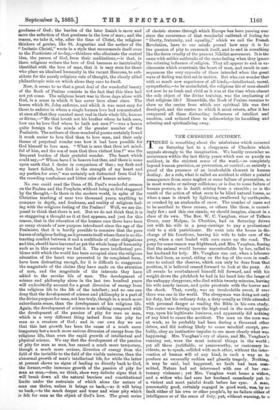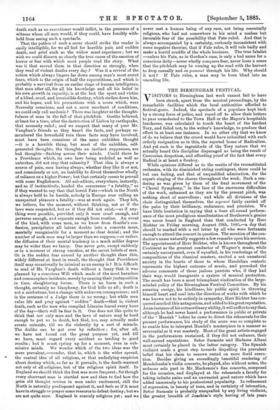THE CHESHIRE ACCIDENT.
THERE is something about the misfortune which occurred on Saturday last to a clergymen of Cheshire which appeals strongly to the imagination. We hardly remember an occurrence within the last thirty years which was so purely an accident, in the strictest sense of the word,—so completely beyond human prevision, or prevention, or control; so entirely a proof of the presence of an incalculable element in human destiny. As a rale, what is called an accident is either a painful consequence from some neglect or some failure of precaution, as in most wrecks or railway collisions; or is due to some failure of human powers, as in death arising from a stumble ; or is the result of the action of what seem to be blind natural forces, as when a man is struck by lightning, swallowed by earthquake, or crushed by an avalanche of snow. The number of cases not to be ascribed to these causes, or others like them, is exceed- ingly few ; and this one stands, we should imagine, almost in a class of its own. The Rev. W. C. Vaughan, vicar of Tallarn Green, near Malpas, in Cheshire, had on Saturday driven out with his wife in a pony-carriige to pay a professional visit to a sick parishioner. He went into the house in dis- charge of his functions, leaving his wife to take care of the pony, when a cart loaded with corn came up the road. The pony for some reason was frightened, and Mrs. Vaughan, fearing that the animal would become uncontrollable by her, called to her husband for help. Mr. Vaughan ran out, when a labourer who had been, as usual, riding on the top of the corn in readi- ness to unload the sheaves, which can only be done from that position, it is believed craned forward to look at the pony. At all events he overbalanced himself, fell forward, and with his weight drove the pitchfork he had in his hand into the lungs of the unhappy clergyman, who died within twenty minutes, leaving his wife nearly insane, and quite prostrate with the horror and the shock. That, surely, was an incalculable event, if ever there was one in the world. The clergyman was doing not only his duty, but his ordinary duty, a duty usually as little attended with personal danger as reading the Bible in his own study. The carter was driving upon the high-road in the most regular way, upon his legitimate business, and apparently did nothing of any kind to cause the accident. The man on the corn was at work, as he probably had been during a thousand other drives, and did nothing likely to cause mischief except, pro- bably, obey an instinctive impulse to see more clearly what was happening. Mrs. Vaughan's cry of alarm, and Mr. Vaughan's running out, were the moat natural things in the world ; yet all these justifiable, or praiseworthy, or customary, in- cidents, so to speak, collided with each other, without the inter- vention of human will of any kind, in such a way as to produce an unusually sudden and ghastly tragedy. Nothing, it may be said, had happened, no fault had been com- mitted, Nature had not intervened with one of her cus- tomary violences ; yet Mrs. Vaughan went home a widow, and a widow who had seen her husband canseleesly put to a violent and most painful death before her eyes. A man, presumably good, certainly engaged in good work, was, by no fault either of his own or other people's, by no failure either of intelligence or of the sense of duty, put, without warning, to a
death such as no executioner would inflict, in the presence of a witness whom all men would, if they could, have forcibly with- held from seeing such a spectacle.
That the pathos of such a scene should strike the reader is easily intelligible, for we all feel for horrible pain and sudden death, and grief such as the widow must experience ; but we wish we could discern as clearly the true cause of the emotion of horror or fear with which most people read the story. What was it that moved them in that direction so strongly, when they read of violent deaths every day ? Was it a revival of the notion which always lingers far down among man's most secret fears, which is the origin of half the superstitions, and which is probably a survival from an earlier stage of human intelligence, that man after all, for all his knowledge and all his belief in his own growth in capacity, is at the last the sport and victim of a blind, cruel, and irresistible destiny, which strikes down him, and his hopes, and his precautions with a scorn which, were Necessity conscious, and not a mere resultant of conditions, we could only call sardonic ? There was laughter at the thought- fulness of man in the fall of that pitchfork. Goethe believed, at least for a time, after the destruction of Lisbon by earthquake, that necessity ruled ; and we suspect that many of poor Mr. Vaughan's friends as they heard the facts, and perhaps re- membered the household ruin those facts may have involved, must have been conscious of the same unbidden thought —it is a horrible thing, but most of the unbidden, self- generated thoughts, the thoughts an instinct suppresses, are bad thoughts—flashing across their minds. Could there be a Providence which, its own laws being undefied as well as unbroken, did not stop that calamity ? That idea is always a source of pain, men having always, whether they like it or not, and consciously or not, an inability to divest themselves wholly of reliance on a higher Power ; but that certainly seems to prevail with some Englishmen. All sub-editors, everywhere, instantly, and as if instinctively, headed the occurrence " a fatality," as if they wanted to say that that horrid Fate—which in the North is always held to be hostile, nobody in Europe ever calling an unexpected pleasure a fatality—was at work again. They felt, we believe, for the moment, without thinking, not as if the laws were suspended, but as if they did not exist,—as if any- thing were possible, provided only it were cruel enough, and perverse enough, and separate enough from routine. An event of the kind, with some mien, as we know from Goethe's con- fession, precipitates all latent doubts into a concrete mass, mentally recognisable for a moment as clear denial ; and the number of such men may be larger than we suppose,—or rather, the diffusion of their mental tendency in a much milder degree may be wider than we fancy. One never gets, except suddenly or in a moment of strong emotion, at the secret beliefs of men. Or is the sudden fear caused by another thought than this, widely different at least in result, the thought that Providence itself may occasionally be inimical as an enemy is ? It is difficult to read of Mr. Vaughan's death without a fancy that it was planned by a conscious Will which made of the most harmless and commonplace incidents, merely by causing their juxtaposition in time, slaughtering forces. There is no harm in such a thought, certainly no blasphemy, for God kills us all ; death is not a misfortune, but a change with unknown consequences ; and in the sentence of a Judge there is no wrong ; but while men value life and pray against " sudden " death—that is, violent death, such as the men who compiled Litanies feared every hour of the day—there will be fear in it. One does not like quite to think that not only man and the laws of nature may be hard enough to put us to death, but God, too, may actually make events coincide, till we die violently by a sort of miracle. The dislike can be got over by reflection ; for, after all, we have not found out the great purpose yet, and till we have, must regard every accident as tending to good results ; but it mast spring up for a moment, even in sub- missive minds. We wonder which of the two ideas was the more prevalent,—wonder, that is, which is the wider spread, • the central idea of all religions, or that underlying suspicion about destiny which, so far as it prevails, is the death-warrant not only of all religions, but of the religious spirit itself. In England we should think the first was more frequent; for though every observant man is startled now and then to find how the grim old thought revives in men under excitement, still the North is naturally predisposed against it, and feels as if it must have in struggle or prayer some resource to defeat destiny; but we are not quite sure. England is scarcely religious yet ; and we never met a human being of any race, not being essentially religions, who had not somewhere in his mind a useless but incurable fear of the possibility that Fate ruled. And that is always accompanied by a certainty, curiously inconsistent with some negative theories, that if Fate rules, it will rule badly and make a horrid muddle of the whole business. The true fatalist —unless his Fate, as in Gordon's case, is only a bad name for a conscious deity—never wholly conquers fear, never loses a sense that the pitchfork may be coming up the road with the harvest to drop casually and en pageant through his life. Why should it not ? If Fate rules, a man may be born blind into an unending life.



































 Previous page
Previous page